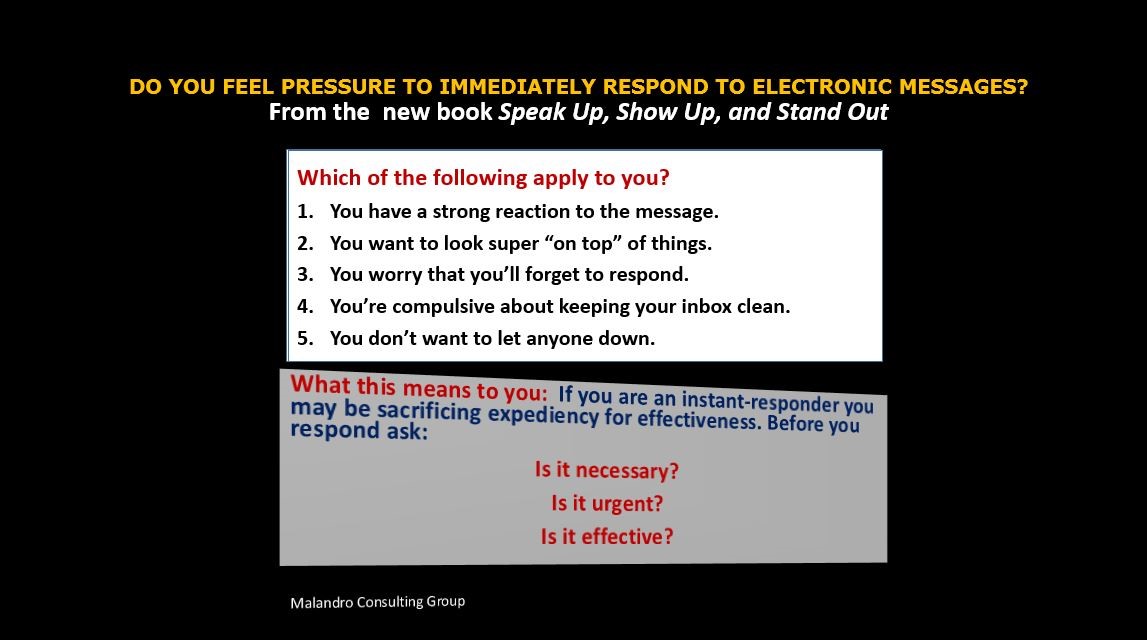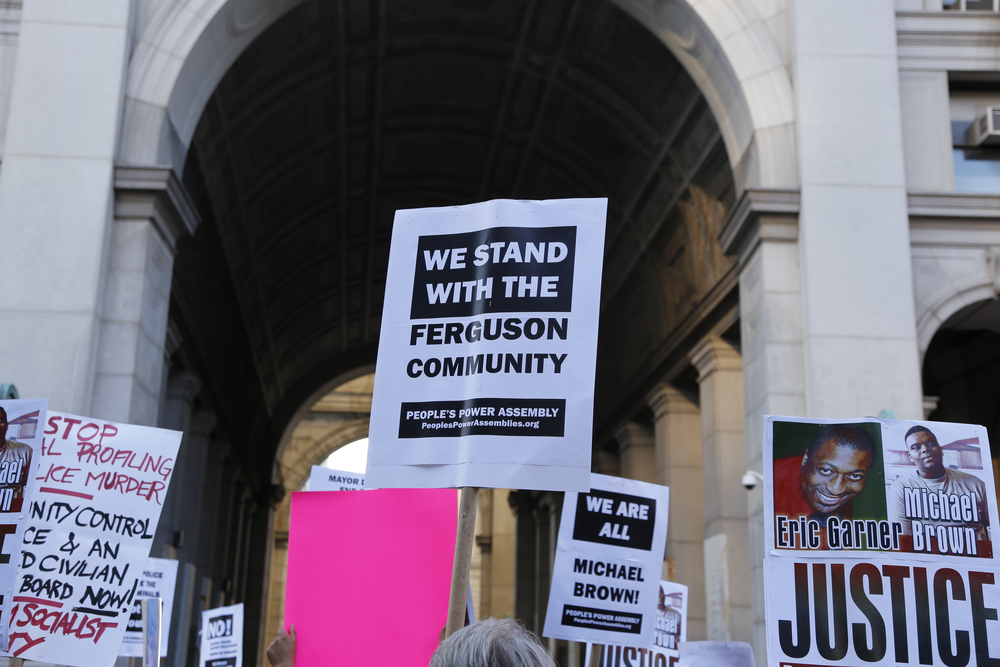
The Riskiest Word to Use at Work:
Try It and See What Happens
By Dr. Loretta Malandro
You’re standing at the altar taking your marriage vows. The person officiating your wedding asks: “Will you take this woman/man to be your lawful wedded wife/husband?” Without hesitation you enthusiastically blurt out your response and say: “I’ll try”.
You’re doomed. Pack your bags and go home. Your marriage is on the skids before it starts.
There’s a reason why we use the words “I do” in marriage vows: It’s the language of commitment. Your marriage partner isn’t going to tolerate your no-commitment response of “I’ll try”.
This negative reaction is not limited to altar; it occurs in the workplace daily. Do you tolerate no-commitment language in yourself and in others? Before you deny your culpability in allowing the word try to persist, consider how many times per day you use this word and how many times you hear it being used by your coworkers, friends, and family.
We keep the overworked word try around for a simple reason: We love the flexibility that it gives us. But let’s cut to the chase. Flexibility is much too nice of a word. What we really love about the word try is its built-in escape hatch: We can effortlessly avoid being held accountable for delivering on a promise for the obvious reason that we never make a promise.
What message are you sending when you use the word try? The word try falls in the category of hedging language: Words and phrases used to avoid 1) making a commitment, 2) taking a decisive stand, and 3) being held accountable.
The definition of the word try is to make an effort to do something, attempt to accomplish or complete something, give something a shot, or take a crack at the problem. Nowhere in this definition will you find anything about committing. Try is not a commitment—it lacks a clear goal, passion, dedication, and confidence.
But there’s more. The word try signals failure before you even step out of the gate. You’re communicating that you might tackle the problem but you are not committing to resolving it or taking accountability for achieving the goal. See blog entitled “Ferguson’s Mayor Uses Slippery Communication”, October 2014, for more examples of hedging language.
Are you losing points on the Perception Scale? If you are in the habit of using the word try at work, in job interviews, in your resume, in electronic communication, or in meetings, you will be labeled as timid, weak, lacking in initiative, and definitely not leader material. The repetitive use of the word try weakens both your message and the perceptions others have of you.
How often does the word “try” creep into your everyday language? Take a look at the following list of commonly used try phrases. Which do you use? What phrases do you hear from your coworkers, your direct reports, and your superiors?
- I’ll give it a try.
- I’ll do my best.
- It’s worth trying.
- I’ll give it my best shot.
- I tried everything.
- I’m trying to be productive.
- I’m trying to explain.
- I’ll try to close the deal.
- I tried to handle the issue.
- Try to keep your chin up.
- I’ll try again.
- I try to act respectful.
Are you sabotaging yourself? Words shape our reality and our actions. When you use the word try—instead of providing a clean “yes” or “no” response or a decisive “I commit” or “I am not committing” statement—you set yourself up for failure. You kill your own motivation to achieve the goal by giving yourself an out before you even begin. Worse, you erode your confidence because what you are saying to yourself is that you are uncertain that you can succeed. When you stumble or fail, instead of recovering quickly, you’ll send your self-esteem in a downward spiral with an “I told you so” to yourself. After all, you didn’t believe in yourself from the beginning.
Imagine using the word “try” to motivate others: Athletic coaches are known for inspiring their teams to achieve great success. How do they do it? There are many views on this matter but one thing is certain: Great coaches do not use hedging language such as try. These coaches take a bold stand and inspire confidence in others.
But what if the following famous coaches used the word try and variations of this term? Would you be inspired? Compare the rewritten quote using try language with the actual quote and see what you think.
- Vince Lombardi, Hall of Fame NFL football coach
Rewritten: “Winning isn’t everything, but it’s worth trying.”
Actual: “Winning isn’t everything, it’s the only thing.”
- Bear Bryant, American college football coach
Rewritten: “I’ll put you through hell, but at the end we will have given it our best shot.”
Actual: “I’ll put you through hell, but at the end of it all we’ll be champions.
- Mike Ditka, Award winning NFL football coach
Rewritten: “If you are determined enough and are willing to pay the price, you will know you have tried your best.”
Actual: “If you are determined enough and willing to pay the price, you can get it done.”
- Herb Brooks, Gold medal-winning head coach of U.S. Olympic hockey team
Rewritten: “You were born to try. You were born to attempt to be a player…This moment is yours so try, try, and try again.”
Actual: “You were born to be a player. You were meant to be here. This moment is yours.”
- Bobby Knight, American basketball coach:
Rewritten: “Most people have the desire to try, few have the desire to prepare to win.”
Actual: “Most people have the will to win, few have the will to prepare to win.”
Simple changes you can make to boost your credibility and confidence: It’s not complicated. To increase your communication effectiveness you will need to take a bold stand and be crystal clear about what you are or are not committing to. Here are a few tips. For additional tips and skills, see Rule 6—Commit or Do Not Commit in Speak Up, Show Up, and Stand Out.
1) Replace “try” with “I will”: Stop trying and just do it. Nike got the point; follow their lead. Use power phrases such as: “I will,” “my commitment is,” “you can count on me to,” or “I promise to”. Then follow through with action and deliver on your commitments.
2) When you really want to say no, say no. Don’t mislead people by using the word try when you really mean no. This will erode your credibility. For instance, say no when you feel a timeframe or commitment is unreasonable or something that you do not want to take on. Be straight and be clear.
3) Confidently take a stand and state your position. Don’t erode how others perceive you by watering down your point-of-view or commitment with the word try or other hedging phrases. Like the Little Engine that could, declare what you will and can do: “I think I can. I think I can. I think I can. I know I can.”
For those of you who love the word try, it does let you ride the fence and avoid being held accountable. This linguistic perk may bring you some small comfort, but don’t lose sight of the fact that in the eyes of your employer or future employer, the word try means you can’t be counted on. Too much reliance on this word, instead of committing or not, can result in you being marginalized, taken off the high performer list, or losing career advancement opportunities. Is this small word worth all of that?
Choose your words carefully. Yoda was right: “There is no try. Only do, or do not.”

Dr. Loretta Malandro is the CEO of the Malandro Consulting Group (www.malandro.com) and the author of several landmark business communication books published by McGraw-Hill including: Fearless Leadership, Say It Right the First Time, and her new book which is being released November 2014, “Speak Up, Show Up, and Stand Out: The 9 Communication Rules You Need to Succeed”.















